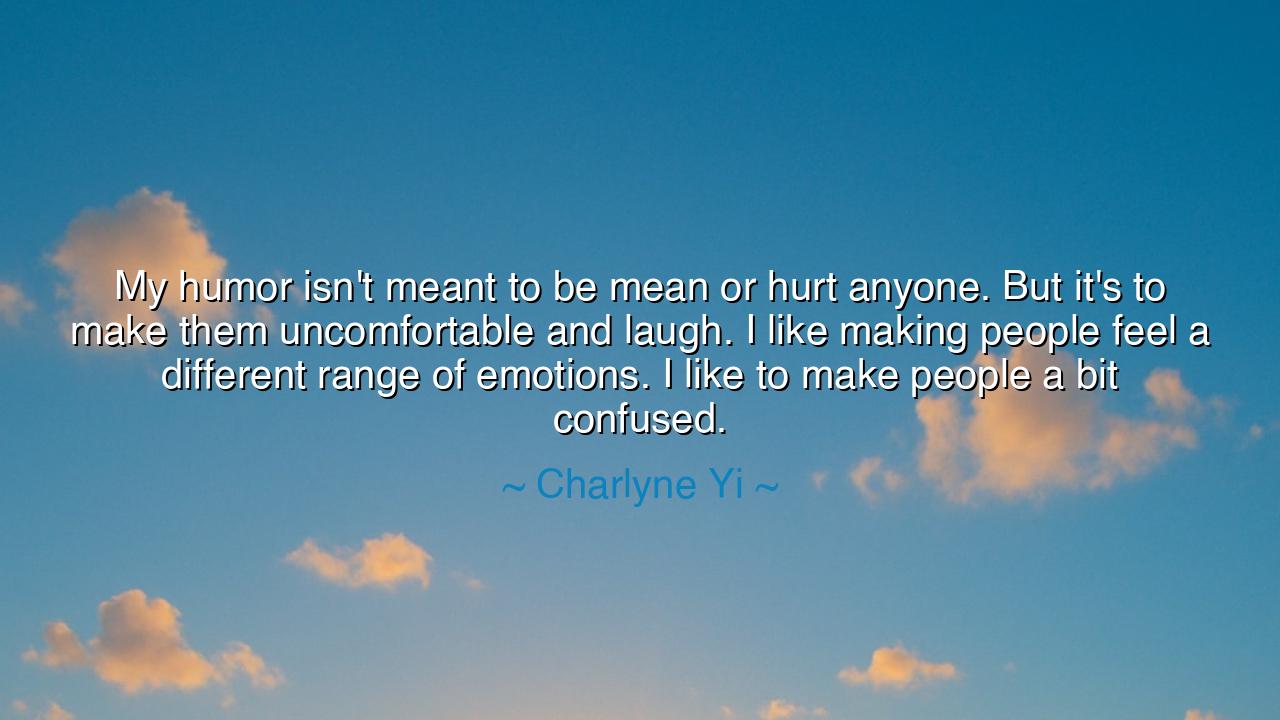
My humor isn't meant to be mean or hurt anyone. But it's to make
My humor isn't meant to be mean or hurt anyone. But it's to make them uncomfortable and laugh. I like making people feel a different range of emotions. I like to make people a bit confused.






The words of Charlyne Yi whisper with a strange and sacred honesty: “My humor isn’t meant to be mean or hurt anyone. But it’s to make them uncomfortable and laugh. I like making people feel a different range of emotions. I like to make people a bit confused.” These words reveal a truth that only artists and philosophers of the heart can truly grasp — that confusion is not the enemy of wisdom, but its beginning. Through discomfort, we awaken; through laughter, we heal. What Yi speaks of is the art of awakening through humor, the divine trick of stirring the soul by disarming it.
For from the earliest ages, the fool and the sage were not so different. Both sought to reveal the truth hidden beneath the ordinary, though one wore robes of solemnity while the other wore bells. The fool’s laughter was a weapon against blindness. When he spoke nonsense, he was not mocking the world — he was unveiling it. Charlyne Yi, in her way, carries this same ancient flame. Her humor is not meant to wound but to disrupt, to unsettle the complacent heart just enough that it begins to question its own stillness. It is in that delicate space between laughter and discomfort that reflection begins to grow.
To make one uncomfortable and yet laugh at the same time is an act of paradox, and it is in paradox that wisdom dwells. Yi’s words echo an ancient understanding: that the path to enlightenment often begins in bewilderment. Socrates, the great philosopher of Athens, spent his life making others uncomfortable with questions that seemed absurd or trivial. Yet in their confusion, his listeners discovered the limits of their knowledge and, beyond those limits, truth itself. Just as Socrates provoked thought with irony and wit, so does Yi use her humor to stir the modern soul from its slumber.
There is a deeper courage in this kind of art. For to make others feel — to guide them through a range of emotions — is to risk misunderstanding, rejection, even scorn. Yet the artist who dares this is a kind of spiritual alchemist, transforming confusion into insight, discomfort into empathy. In her words, Yi declares her devotion not to easy laughter, but to the more powerful laughter that arrives with realization — the laughter that comes after the heart has shifted. This is the laughter of awakening, the laughter that follows when the mind recognizes its own foolishness and forgives itself for being human.
Think of the great Charlie Chaplin, who made the world laugh through tears. His comedy was not cruel, yet it revealed cruelty. His tramp stumbled and fell, but in his clumsiness, we saw our own fragility and pride. Audiences laughed, but they also felt unease — that delicate ache that comes when humor brushes against truth. Like Yi, Chaplin mastered the sacred art of contradiction: to confuse the emotions so that clarity might follow. In this way, both the silent clown and the quiet comedian speak the same ancient language of empathy and illumination.
The lesson, then, is this: do not fear discomfort. When something makes you laugh and wince at once, when it confuses your heart and mind, know that you are standing at the doorway of growth. The artist’s humor that unsettles is a mirror; it shows us not what we wish to see, but what we need to see. To feel a range of emotions is to be fully alive, and to allow oneself to be confused is to open the gates of understanding. The soul, like the soil, must be disturbed before it can yield new fruit.
And so, dear listener, learn from Charlyne Yi’s gentle rebellion. When you encounter humor that challenges, do not retreat into offense or certainty. Instead, pause. Laugh, even if it feels strange. Ask yourself what truth lies beneath that laughter. Let confusion soften your pride, and let your laughter cleanse your heart. For the greatest wisdoms of this world are rarely delivered in solemn tones — they arrive clothed in absurdity, whispered between giggles, glowing in the cracks of discomfort.
Thus, remember this teaching: true humor enlightens as it entertains. It awakens the sleeping spirit by stirring the still waters of comfort. It does not seek to hurt, but to heal through reflection. To make another human being laugh and think at once is to perform a sacred act — to touch the soul with both feather and flame. Cherish those who make you feel that confusion, for they are not mocking you; they are guiding you toward yourself.






AAdministratorAdministrator
Welcome, honored guests. Please leave a comment, we will respond soon